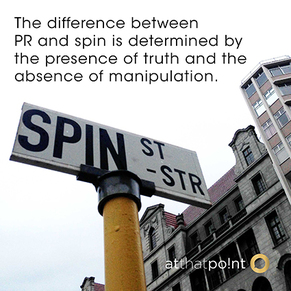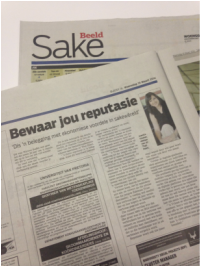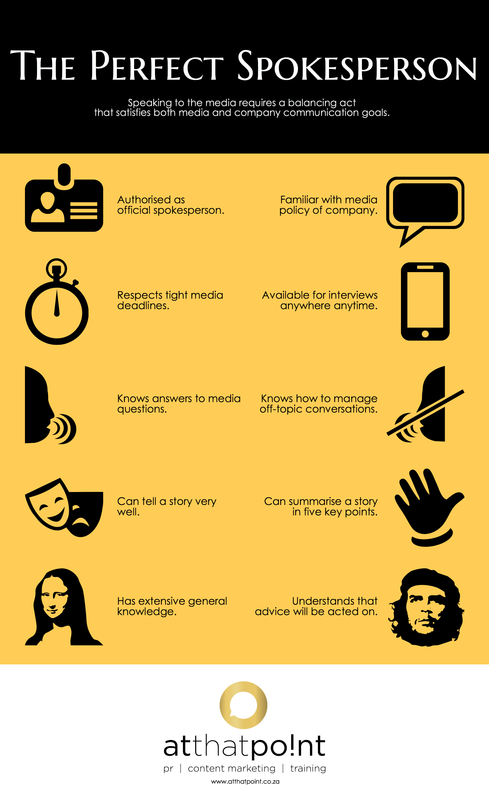|
We are very lucky to have clients that are incredibly well-informed and passionate about not only their own products and services, but also about what is happening in their industry and the world around them.
For any company aiming to create fortune through fame it is necessary to appoint as spokesperson someone with a unique set of skills. The Edelman Trust Barometer most recently indicated that the most trusted source of information is becoming "people like me" and it might therefore not be the best idea to appoint the CEO as spokesperson, especially if said CEO is uncomfortable with any of the below requirements.
0 Comments
 If you like stability, predictability and control, public relations (PR) might not be the best career choice for you. Why is it then that the PR industry filled to the brim with type-A personalities who are absolutely brilliant at what they do? In one word: influence. The well-known Serenity Prayer includes a plea for strength to accept the things we cannot change and the courage to change the things we can. PR professionals tend to ignore the first bit, and hold on for dear life to the “change what I can” bit ... and as tightly to our smartphones. Although the PR industry can’t, on behalf of their clients, force people to buy/vote/attend/#selfie (for that is called sales*), and although the PR industry can’t bombard people with messages that eventually make them buy/vote/attend/#selfie out of pure desperation to get rid of the message (for that is called advertising*), what the PR industry can do very effectively is influence. Now, just to make one thing very clear, by influencing I do not under any circumstances promote/advise/condone/like manipulation. My team and I firmly believe that there is a massive difference between PR and so-called spin. The stuff that gets the PR industry excited (publicity results, target market behaviours, reputation and perception changes, conversion rates etc) are all based on decisions by people who are soundly unaware of the goals and objectives neatly mapped out in a PR programme or campaign plan. It hasn’t mattered in quite some time what a company says about itself, but rather what employees and customers who deal with the company say to anyone who is willing to listen. People have become savvy to the marketing game, making it immensely difficult to break through the content cluttering our email inboxes and social media newsfeeds. Except when people WANT to know. Usually when people want to know something, they are prepared to spend time on finding and understanding information. And they prefer information in a format they can easily understand, such as stories about brands told by their friends or the media. Which is where influence enters the fray. PR professionals worth their salt do not influence the truth; that is called lying. They do not influence people, as that could easily, in this context, border on manipulation. PR professionals who understand that content is king work hard at influencing the entire communication process to balance their client’s expectations, goals and requirements with newsroom and other distributor needs in order to deliver the best possible stories in a timely and engaging manner to keep people returning for more. In short, true PR professionals enable those who would like to spread the word, to do so easily and accurately. A relentless drive for digging deep to get to the story behind the client brief, and finding a visual and a voice that can tell (not sell) that story to those who are desperate for content that doesn’t play the bait-and-switch game, and providing that information in a neat package to a customer or media practitioner ... THAT is how PR professionals can use their multitude of skills to keep clients happy, build trust with newsrooms, and keep the PR industry alive. Gone are the days where “lunching the press”, sending cheap gimmicky desk toys (or expensive bottles of imported anything), and press conferences that could’ve been covered with a simple media release. Gone are the days of the celebrity CEO, and even the celebrity brand, where everyone published everything just because. If you like life easy, don’t get into PR. If you don’t mind a fanatical dedication to learning, developing new skills on the go, and figuring out every single situation on its own merit in order to influence what you can, then this industry is the place to #LoveThisJob *Disclaimer: I have the utmost respect for both the sales and advertising professions, for both are practiced by some of the most hard-working, creative, tough nut people I know. The mentions in the article of the respective professions are therefore merely used as a tongue-in-cheek way of crudely explaining the differences between the verticals of the wonderful world of marketing.  - Hierdie artikel het verskyn in Sake24 op 18 Maart 2014 - “Reputasie is ‘n belegging,” sê Juanita Vorster, eienaar van bemarkingskommunikasie agentskap At That Point. “Die reputasie van ‘n persoon beïnvloed hoeveel hy/sy vertrou word as vriend, raadgewer en werknemer. Dit is dus belangrik om deurgaans tyd te spandeer om jou persoonlike reputasie te bou en verfyn.” “Wanneer ons verwys na iemand se reputasie, verwys ons na ons eie direkte of indirekte ervaring van die persoon,” verduidelik Vorster. “Die beloftes wat die persoon maak oor ‘n tydperk, gekombineer met die uitvoering, of dan nie, van daardie beloftes, is wat op die ou end gesien word as iemand se reputasie.” Werknemers moet bewus gemaak word van die impak van hul persoonlike reputasie opdie van die maatskappy waarvoor hulle werk. ‘n Blasé benadering tot die impak van reputasie is baie gevaarlik, en het al vir menige flaters met ernstige gevolge gesorg, vir beide individue en maatskappye. Mense koop by mense, nie by maatskappye nie Bewyse hiervan word gestaaf deur die uitslae van die 2014 Edelman Trust Barometer, ‘n jaarlikse verslag wat aandui hoe vertroue van jaar na jaar verander, en hoe koper besluite gebasseer word op vertroue. Die nuutste verslag wys dat daar tussen 2009 en 2014 aansienlike groei was in die vertroue wat verbruikers het in gewone werknemers en iemand met wie hulle as individu kan identifiseër, eerder as die boodskappe wat deur middel van advertensie gekommunikeer word. Selfs die hoof van ‘n maatskappy het nie meer die grootste invloed op hoe verbruikers besluite neem nie. Nie net wat gesê word nie, maar wie saam praat Digitale platforms skep geleenthede vir individue en organisasies om te direk kontak te maak met persone en groepe wat gewoonlik ontoeganklik was. Die positiewe gevolg hiervan is maklike toegang na inspirasie, motivering en hulp van verskeie oorde, alles met ‘n minimum moeite. Deur aktief deel te neem aan digitale gesprekke bou ‘n individu sy/haar reputasie, beide in die digitale en fisiese realiteit. “Die gemak van interaksie op digitale platforms dra egter die risiko dat ‘n persoon se reputasie negatief beïnvloed kan word deur nie net dit wat hy/sy self op die platforms plaas nie, maar deur die mense wat hulle toelaat om saam te praat,” waarsku Vorster. “’n Vriend wie se kommentaar afbreek maak aan ander, of fotos van die naweek se sportspan prestasie vieringe wat effe verder gegaan het as wat betaambaar is, of selfs net ‘n boodskap met ‘n swetswoord in wat uit pure frustrasie geplaas is, kan ‘n andersins vlekkelose reputasie beskadig.” “Al hoe meer werkgewers gebruik digitale sosiale platforms soos Facebook, Twitter en LinkedIn om hulle te help om ‘n besluit te neem oor wie die ideale kandidaat vir ‘n pos is. Indien die werkgewer hul persepsie basseer op ‘n werksoeker se aanlyn reputasie, en dit strook nie met die kultuur of verwagting van die werkgewer nie, is die kans dat selfs die aanvanklike perfekte kandidaat nie verder in ag geneem sal word vir die pos nie.” |
Archives
November 2020
Categories
All
|


 RSS Feed
RSS Feed